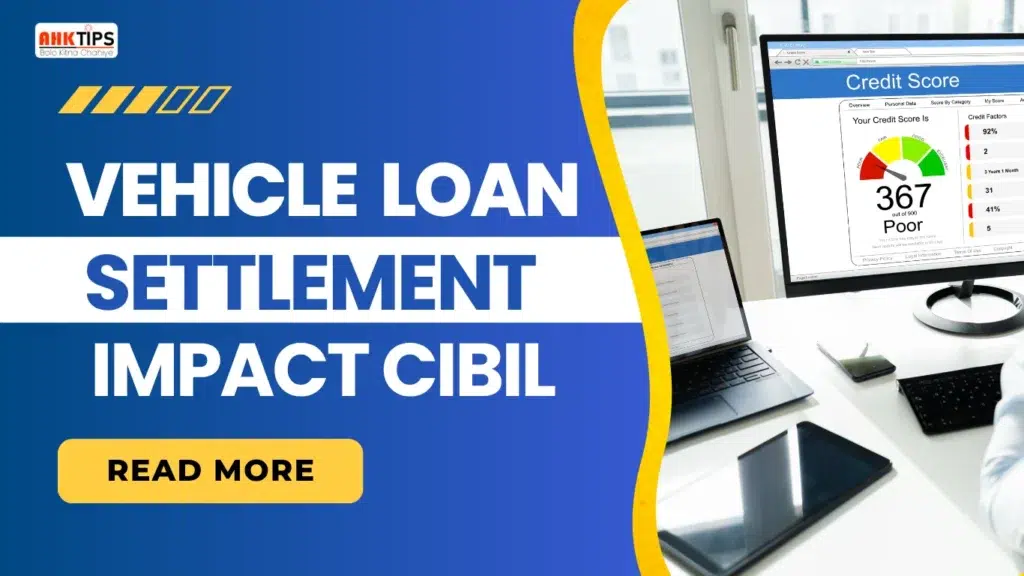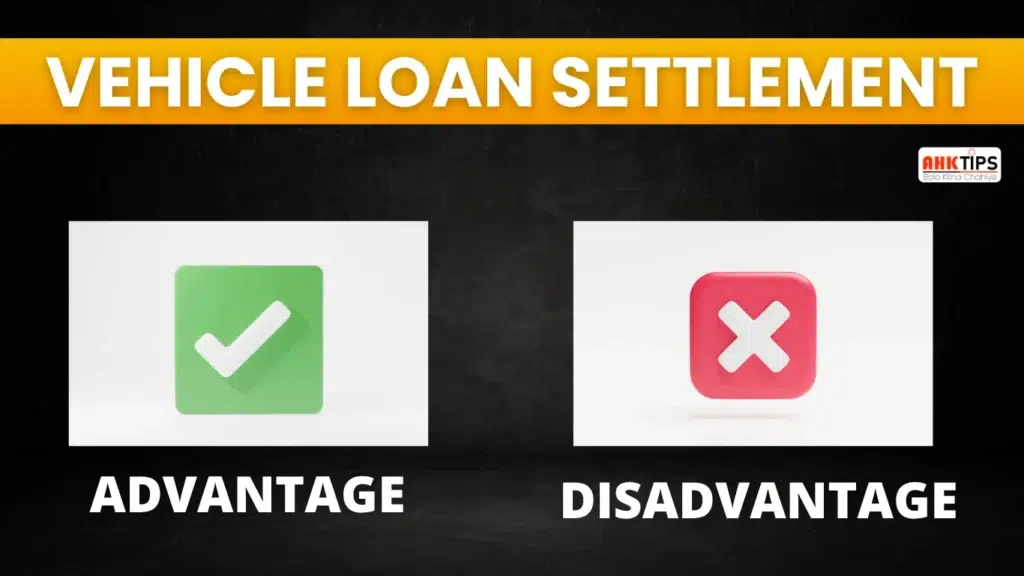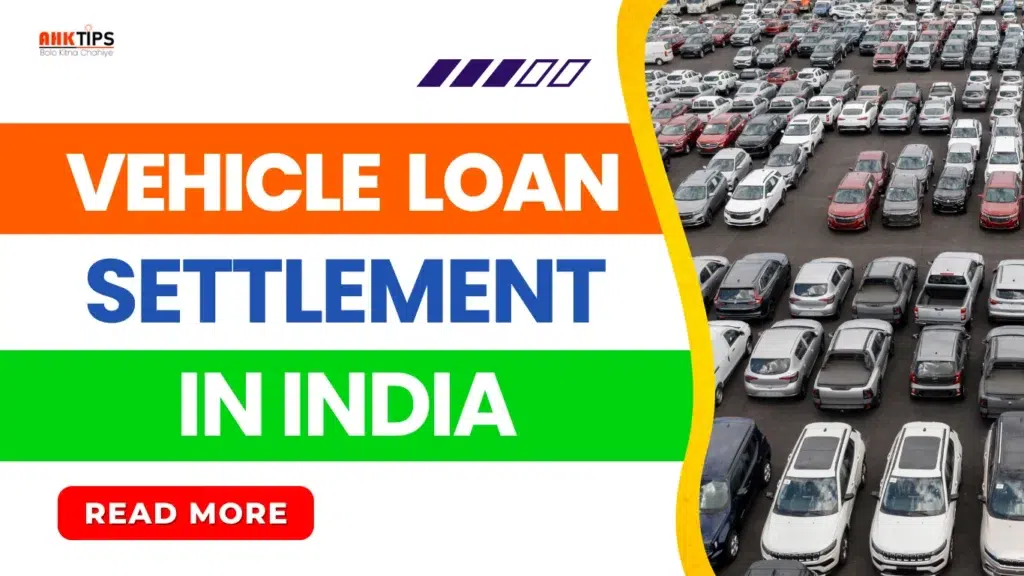





Returning a vehicle loan leaves you with less than you first borrowed. This can stain your CIBIL record, even if it helps with financial trouble for a while. Your credit score drops, so lenders may see you as a riskier borrower. This can affect your capacity for credit cards, mortgages, or future loan applications. Borrowing gets harder since the settled account shows on your CIBIL report for years. To boost your score, pay on time, use credit, and avoid taking out new loans right after settlement. With discipline and determination, you can improve your finances. This shows lenders you are reliable, which can lead to better borrowing options in the future.
Paying off a vehicle loan can affect your credit score in the long run. Still, it might feel like a good way to reduce financial stress. Paying back less than what you owe can lower your CIBIL score. This may make it harder to borrow money in the future. Lenders see settlements as evidence of your likely problems paying back past-due debt. This article shows how a vehicle loan settlement appears on your CIBIL report. It looks at how this can affect your financial future and suggests ways to improve your credit score. It explains the differences between full payments and settlements. It also covers how long settlements stay on your report. Plus, it offers steps you can take to start rebuilding your credit.
Paying off a car loan could seem like a huge relief when you’re striving to make ends meet. There is a negative: a drop in your CIBIL score that reduces your financial burden for a short time. Your credit score shows your financial health. Lenders and banks use it to see if you can borrow money.
Paying off a vehicle loan leaves less than your original debt. Your bank marks your account as “settled,” not “closed. ” Then it tells the credit bureaus.
This mark indicates to lenders that you did not repay your debt in full. It shows financial trouble and breaks the original agreement’s terms.
Once you pay off a vehicle loan, your CIBIL score shows a drop in repayment discipline. Lenders will notice financial vulnerability in a settled account. Rather than following your repayment schedule, you paid a lesser amount to pay off your debt.
This immediately reduces your score and increases the difficulty of borrowing going forward. If banks see you as a high-risk borrower, it can lower your chances of getting a credit card, mortgage, or car loan.
Your CIBIL rating should show your financial dependability. A settlement represents an unpaid debt. Lenders are worried because this hints that you might face financial troubles again.
A good credit score means you are a responsible borrower. It shows you will pay back what you owe to banks and other lenders. A drop in your score after paying off a vehicle loan means you seem riskier. This lowers the chances of your applications getting approved.
Years pass, and your credit report reflects a settled status. Usually, it remains there for more than seven years following arrival. Any lender reviewing your record during this time will see this sign.
This means you might struggle to borrow on good terms for a long time, even after paying off your loans. If you’re facing financial issues, it’s important to pay on time and in full. Also, consider other options.
If you need to settle your auto loan, you can take steps to rebuild your credit.
On any other credit card or loan, make sure you pay any future invoices on time and avoid missing any payments. Minimise your borrowing and make sensible credit use.
With careful financial habits, you can boost your score. This will help you qualify for loans again.
Settling your vehicle loan will hurt your credit score for good. It may lower your debt load for a while, but the impact on your credit is lasting. It shows lenders that you didn’t fully repay your loan. This could impact your borrowing options for years.
Closing a vehicle loan can feel like a good way to end a tough time, especially when payments get hard. After your lender approves a settlement, they report it to credit bureaus like CIBIL. Your credit report will show this, and your financial future may suffer.
When you and your lender agree to settle your loan for less than what you owe, it’s called a vehicle loan settlement. This usually happens when you face financial trouble. You may not be able to pay back the full debt.
It lowers your monthly payments, but it doesn’t erase your debts. The bank writes off the remaining amount and recovers some of what it owes.
The bank updates your loan status in the records it supplies to CIBIL once you pay off your loan. They mark the loan as “settled,” not as “closed” or “paid in full.”
Future lenders that review your credit record will know this. The bank shares this info to keep accurate records of how clients repay.
Banks and lenders document settled loans to CIBIL. This shows how loan handlers managed the loan. The lender cancelled the remaining amount after accepting a partial payment.
This data enables other banks to check their future lending to you for risk. A settled loan shows that you had trouble paying your debts. The lender lost money by closing your account.
By reporting this, lenders help keep the credit system open. This way, other lenders can see your borrowing history if you apply for new loans.
A settled status shown on your CIBIL report reduces your credit score. This happens because the settlement shows your loan terms were not what you intended. Lenders view this as a negative mark since it implies you might not pay back the agreed-upon future loans.
This could make obtaining a credit card, a new loan, or any other type of borrowing more difficult. If you qualify, you might need to accept tougher terms or higher interest rates.
Your lender reports a settled status that stays on your CIBIL report for several years. Any lender who checks your credit report during this time will see this information.
This can limit your options even after you’ve paid off the original vehicle loan and want to borrow again. Knowing how settlement affects your report is key. Taking steps to rebuild your credit will help you move forward.
Before choosing a settlement, it’s a good idea to talk with your lender about loan restructuring. To reduce financial stress, you can try EMI changes or loan holidays. These options can help maintain your CIBIL score.
Paying off an auto loan affects your CIBIL report. Understanding this can help you avoid money issues later. Always consider the implications before opting for a settlement.
Banks or financial institutions record repayment history from loans to credit bureaus. CIBIL is one of the most used bureaus in India. It evaluates borrowing and repayment behaviour. Future loans and their terms depend a lot on your CIBIL report.
Two other ways to conclude a loan are full payment and settlement. Both can pay your debts, but they have different effects on your credit.
Full payment indicates that you reimburse the bank the entire amount you owe. This covers basic, relevant interest as well as any late fines.
Your bank records your entire debt clearing as “closed” or “paid in full, in CIBIL.
This shows future creditors that you kept your promise. You made all payments with complete responsibility. It demonstrates your ability to manage financial responsibilities and a low-risk borrowing style.
Full pay helps your credit history to be better. It shows strong financial discipline and great capacity to pay back borrowed money.
Paying off all your debts can boost or stabilise your CIBIL score.
This helps you borrow in the future with lower interest rates and better terms.
A settled account points to financial difficulty and incomplete payback.
Future lenders should watch for this. It shows you didn’t stick to your original repayment terms.
A settlement can lower your CIBIL score. This shows lenders that you may pose a risk.
Your report might show this drop for years. This makes it hard for you to borrow again or negotiate good terms.
After a settlement, your CIBIL score declines, so banks could see you as a higher-risk borrower.
This makes obtaining a new mortgage, auto loan, or even a credit card difficult going forward.
Some lenders may approve your application. But the interest rate will be much higher, and the terms will be less flexible.
How you handle your debts will shape your borrowing future.
Plan your finances well. This helps you avoid settlements and maintain a good credit score. This helps ensure a more stable financial future.
Also, to be better off by making a full payment. It supports long-term financing demands and maintains your credit score intact. Settlement should only be an option in serious financial trouble. Use it when no other choices are left.
Understanding how full payment affects things compared to settlement is important. CIBIL guides you toward the choice that safeguards your creditworthiness and financial future.
If you’re having money troubles, settling a vehicle loan can feel like a smart way to pay it back. Yet, there are some downsides too. Many borrowers want to know how long this settlement will change their CIBIL score. Your CIBIL report records all your borrowing and loan repayment behaviour. It tells whether you chose to settle your account, went into debt, or made payments on time. So, this information marks the vehicle loan settlement on your record.
CIBIL marks your account as “settled” when your bank informs them about the settlement. They will not label it as “closed” or “paid in full.”
This shows lenders you worked out a deal with the bank. You agreed to pay a smaller amount instead of the full loan.
This approach is mostly meant to present a whole picture of your financial past.
Lenders want to see if you took a smaller payment after facing money issues or if you paid off your debts fully.
This information tells you if you are a cautious borrower or someone who may find it hard to pay future debts.
A settled loan account shows credit bureaus that the borrower didn’t fully pay back the loan. This means they didn’t meet the original repayment terms. This can lower the credit score generally and create a bad image. The CIBIL score captures financial behaviour; a settlement indicates irregular repayment.
Loan size, repayment history, and financial behaviour affect credit scores. The impact is usually clear. The score might remain affected for a while, even if a person pays back other loans on time after the settlement.
Settlement remarks can remain on your CIBIL report for a long time. CIBIL usually retains this data on credit reports for several years. Lenders looking at your credit report will notice that you paid the loan in a way that wasn’t agreed upon.
Settlement status can make it challenging to get a credit card or a new loan approved. If they approve the applications, the terms may not be favourable. Lenders view settlement loans as evidence of past financial risk or stress.
After the settlement, one can aim to rebuild their credit profile. The settlement history is not finished yet. Still, if you stick to good financial habits, your score will rise over time. To rebuild creditworthiness, pay all EMIs and credit card bills on time.
Also, checking your CIBIL report often has its perks. Sometimes, errors in reporting can affect your score even more. If you notice any discrepancies, you can file a dispute and ask for a correction.
Consider settlement only when no other option is possible. It may provide temporary relief, but it may create long-term problems with financing. First, talk to your lender. Discuss restructuring or repayment options before making a choice. These actions will help keep your credit score more secure than a settlement.
Knowing the auto vehicle loan settlement period impacts CIBIL helps borrowers make informed decisions. Managing credit well ensures you can get loans in the future. It also helps avoid lasting negative marks on your credit report.
Securing a vehicle loan can ease financial stress. But it may hurt your credit profile. Many people ask how they may restore their credit score following such a settlement. Your CIBIL score will improve over time if you take the right steps after repaying your vehicle loan.
The lender tells CIBIL you paid less than the whole outstanding amount when a vehicle loan is paid off. Your credit report notes this as “settled.” Lenders see this as evidence of financial strain, which lowers your credit score. Before you start working to improve your score, you should know this influence.
Paying all your future dues on time will help you raise your CIBIL score to the highest level. When you pay your credit card, utility bills, or personal loan on time, it shows lenders you are good with money. Make it a top goal to keep on target with payments since even a little delay might lower your score.
You might find yourself needing a new loan to handle your money following a settlement. Applying for several loans quickly, though, will lower your credit score even more. It expresses credit-related desperation, which lenders consider dangerous conduct. Wait for your score to improve. Then, consider giving fresh credit.
If you have a credit card, aim to spend far less than the greatest. A smaller credit usage ratio has a positive impact on your credit report. Try to use a little bit of your credit and pay off the debts in full each month. This shows that you can control credit without depending too much on it.
Reviewing your CIBIL report often is smart. Mistakes or old data can keep hurting your score, even if you’ve fixed them. Should you discover errors, dispute CIBIL and have them fixed. Recovering credit requires a clear, accurate credit report.
Start with credit cards or secured loans that you back with a fixed deposit. They help build a solid repayment record and are easier to manage, even with bad credit. Your CIBIL score will rise over time as you maintain good behaviour.
Improving your CIBIL score after settling a vehicle loan takes time. You can’t do it overnight. One needs constant work and patience. Demonstrating financial discipline over time can rebuild lender trust. This will help you access better borrowing terms down the line.
Emphasise developing strong credit practices and stay dedicated to your financial objectives. Your hard work will help you overcome settlement issues and improve your credit.
Paying off a vehicle loan costs money, but it can give you short-term financial relief. Your CIBIL score drops, and years later, lenders could classify you as a high-risk borrower. This is not permanent, even if it can complicate borrowing. You can boost your credit score by taking smart financial steps. Pay your debts by the due date, limit your borrowing, and maintain a moderate use of credit. This process takes discipline and patience. Over time, you will show lenders that you are dependable again. Settlement is not the end, even if it may affect your financial future. You can follow simple steps to take control of your finances.
Que: What does “vehicle loan settlement” mean?
Ans: The bank notes the closed account, and you pay back less than the amount you first borrowed.
Que: How long does a vehicle loan settlement stay on CIBIL?
The settlement will appear on your CIBIL record for seven years. This will affect your borrowing ability during that time.
Que: Will my CIBIL score drop after a settlement?
Your CIBIL score often drops after a settlement. This shows you didn’t repay the full amount you borrowed.
Que: How can I improve my CIBIL score after a vehicle loan settlement?
To boost your score: Pay any overdue bills on time. Wait before borrowing money. Use credit wisely and sparingly. Review your report for errors.
Previous Post

Next Post
